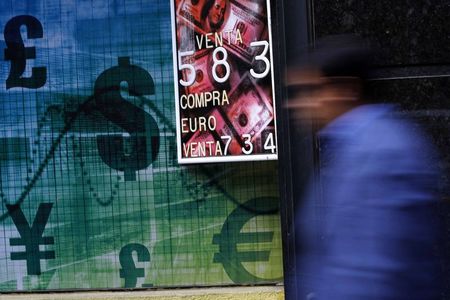Reserve Drawdown of $105 Billion Signals Emerging Currency Risk
Bloomberg
Published Apr 08, 2020 06:00PM ET
Updated Apr 08, 2020 06:45PM ET

Reserve Drawdown of $105 Billion Signals Emerging Currency Risk
(Bloomberg) -- The decade-long surge in foreign-exchange reserves among emerging markets is coming to an end, highlighting the danger posed by future currency depreciation.
China’s holdings fell by $46.1 billion in March, the most since late 2016, official data showed late Tuesday. The drawdown accounted for the lion’s share of the $105 billion that 10 emerging-market central banks, including Turkey, India and Brazil, yanked from their reserves last month to stem currency losses.
The declines underscore the clamor for dollars that rocked foreign-exchange markets around the world during March, driving the MSCI EM Currency Index to its sharpest retreat since May 2012. And with commodity prices and export earnings in the doldrums as the coronavirus crisis deepens, the outlook for many emerging-market currencies isn’t much better.
“I expect another leg of strong downward pressure on emerging currencies as the magnitude of global recession becomes clear,” said Dariusz Kowalczyk, a senior emerging-market strategist at Credit Agricole (PA:CAGR) CIB in Hong Kong. “Countries with external deficits and high external debt compared to foreign-exchange reserves are the most vulnerable.” Indonesia, India and the Philippines are most at risk in Asia, he said.
Good or Bad EM? Current-Account Marks Divide for Bond Investors
The Markit CDX Emerging Markets Index of credit default swap spreads blew out to record highs last month as traders factored in higher probability of missed payments amid the collapse in oil prices and concern China will be rocked by a slump in demand from Europe and the Americas.
Emerging markets suffered about $83 billion of outflows in March, a figure that may grow to between $500 billion and $750 billion if the exodus is anything like 2008 and 2015, according to Bank of New York Mellon (NYSE:BK) Corp.
The prospect of a global recession may keep the U.S. dollar in demand over the next few months, raising the risk of intensifying capital flight and a further drop in reserves.
Should China’s reserves dip below the $3 trillion level, it would ring alarm bells for investors. Russia’s March international reserve assets, due to be released April 10, are forecast to have dropped by $10 billion. The Philippines is also set to publish reserves data this month.
©2020 Bloomberg L.P.
Written By: Bloomberg
Trading in financial instruments and/or cryptocurrencies involves high risks including the risk of losing some, or all, of your investment amount, and may not be suitable for all investors. Prices of cryptocurrencies are extremely volatile and may be affected by external factors such as financial, regulatory or political events. Trading on margin increases the financial risks.
Before deciding to trade in financial instrument or cryptocurrencies you should be fully informed of the risks and costs associated with trading the financial markets, carefully consider your investment objectives, level of experience, and risk appetite, and seek professional advice where needed.
Fusion Media would like to remind you that the data contained in this website is not necessarily real-time nor accurate. The data and prices on the website are not necessarily provided by any market or exchange, but may be provided by market makers, and so prices may not be accurate and may differ from the actual price at any given market, meaning prices are indicative and not appropriate for trading purposes. Fusion Media and any provider of the data contained in this website will not accept liability for any loss or damage as a result of your trading, or your reliance on the information contained within this website.
It is prohibited to use, store, reproduce, display, modify, transmit or distribute the data contained in this website without the explicit prior written permission of Fusion Media and/or the data provider. All intellectual property rights are reserved by the providers and/or the exchange providing the data contained in this website.
Fusion Media may be compensated by the advertisers that appear on the website, based on your interaction with the advertisements or advertisers.